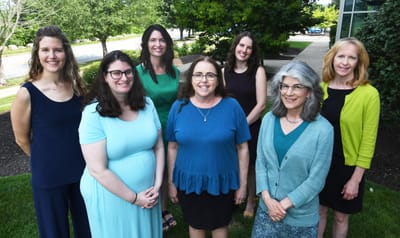About The CENTER

Learn More about CCMHR Interventions
Integrated Illness Self-Management and Recovery (I-IMR)
Based on Illness Management and Recovery, Integrated Illness Management and Recovery is an evidence-based disease self-management program for people with a diagnosis of a mental illness who are also at risk for/or managing physical health problems. The program can be delivered individually or in a group. Provider training and train-the-trainer certification is available.
Skills Training (HOPES)
Helping Ourselves Pursue and Experience Success (HOPES) is a psychosocial skills training program aimed at improving social functioning in people with a serious mental illness. HOPES can be delivered in a group format or through individually-tailored sessions targeting the person's needs.
Tobacco Dependence
Our group has initiated a number of programs targeting tobacco dependence in people with a diagnosis of a mental health condition. These interventions include group and individual formats as well as cessation and harm reduction approaches.
Telehealth and Remote Monitoring
Telehealth and Remote Monitoring is becoming an increasingly important part of our research portfolio. We have developed and are testing a number of telehealth program for people with unstable psychiatric symptoms, recent inpatient stays for psychiatric symptoms, co-morbid psychiatric/medical conditions, and smoking cessation. These programs allow the provider to get daily information about the status of the telehealth user while simultaneously providing a self-management training curriculum through the tablet/smartphone.
What We Do

Research
Our research portfolio includes numerous federally funded research studies contributing significantly to the field and an ever-growing base of knowledge about best practices for people with serious mental illness.

Training
We provide training for organizations and clinicians in interventions for people with serious mental illness. Training is available for delivery of psychosocial skills training models, integrated illness self-management training (I-IMR), and smoking cessation and harm reduction for nicotine dependence.

Program Evaluation and Consultation
We are always looking to learn and work with community service providers. Whether a collaboration involves serving as a potential research site while also offering a unique intervention to service users or providing evaluation support for a new service being implemented at your organization. Contact us to discuss how we can partner together.
Who We are
Sarah I. Pratt, PhD
Center Director
Dr. Pratt is an Associate Professor in Psychiatry at the Geisel School of Medicine at Dartmouth, Principal Scientist at Dartmouth-Hitchcock, and Director of the Center for Collaborative Mental Health Research. A clinical psychologist by training, she has over 20 years of experience leading research studies focused on developing and evaluating interventions to enhance the health and functioning of people with serious mental illness. She has created interventions with standardized curricula designed to teach people with serious mental illness how to co-manage mental and physical health problems, enhance psychosocial functioning, improve health and fitness, quit smoking, and use electronic cigarettes for tobacco harm reduction. She and her team have partnered with community mental health centers across the country to establish an evidence base for these interventions. Dr. Pratt has authored numerous articles and book chapters and provides training and supervision on best practices to clinicians and other staff in community mental health settings across the country.
Meghan Santos, MSW, LICSW
Project Director
Meghan Santos is a licensed clinical social worker and interventions researcher at Dartmouth Health in the Department of Psychiatry. She has extensive experience managing the implementation of research projects in community mental health settings. Over the past 20 years, she has also gained expertise in the development and delivery of interventions for people with serious mental illness, such as Integrated Illness Management and Recovery, Helping Ourselves Experience and Pursue Success (HOPES), and Telephone-based CBT for Smoking Cessation. She also has experience training providers to deliver these interventions, providing ongoing supervision to ensure integrity to the intervention models.
Gail Williams, MS, MFT
Project Director
Gail Williams has worked in the mental health field for over 20 years in a variety of roles; addiction treatment, parent education and support, afterschool programming for at risk youth, health promotion for adults with serious mental illness and intervention research. She has experience as the original program director of the InSHAPE program, and as a trainer of InSHAPE health mentors. Gail is a master trainer of the Stanford Chronic Disease and Chronic Pain Self-Management Programs. Gail has a MS in Marriage and Family Therapy, and is working toward MFT licensure. As a member of the CCMHR team, Gail participates in design, implementation, training, supervision and intervention delivery on multiple research studies.
Joelle Ferron, PhD
Joelle Ferron is a Social Worker and Assistant Professor in the Department of Psychiatry and has been working with and for individuals with severe mental illness since her time as a residential counselor in 1994. Over the past 15 year, she has focused on the development and research of health behavioral interventions for adults with SMI. Dr. Ferron is particularly interested in improving, creating, and testing new smoking cessation interventions for this vulnerable group.
Cynthia Bianco, MS
Research Coordinator
Cindy Bianco, MS holds a Master’s degree in Clinical Psychology and she is currently working towards a Master’s in Applied Statistics. She has been a part of the Center for Collaborative Mental Health Research (CCMHR) for 8 years. Cindy is involved in various aspects of research with main duties concerning data management, analysis, manuscript preparations and submissions.
Jenna Bourassa, BA
Research Coordinator
Jenna Bourassa is a recent graduate of Middlebury College where she studied both Psychology and English and American Literatures. She joined the team in July of 2022, and has developed a deep interest in the development and evaluation of interventions for people with serious mental illness. She hopes to pursue a Ph.D. in this field in the near future. Jenna works with the team doing data collection, analysis, and manuscript preparation.
Mary Brunette, MD
What We Do

Research
Our research portfolio includes numerous federally funded research studies contributing significantly to the field and an ever-growing base of knowledge about best practices for people with serious mental illness.

Training
We provide training for organizations and clinicians in interventions for people with serious mental illness. Training is available for delivery of psychosocial skills training models, integrated illness self-management training (I-IMR), and smoking cessation and harm reduction for nicotine dependence.

Program Evaluation and Consultation
We are always looking to learn and work with community service providers. Whether a collaboration involves serving as a potential research site while also offering a unique intervention to service users or providing evaluation support for a new service being implemented at your organization. Contact us to discuss how we can partner together.
How to Contact
- 70 Commercial Street, Suite 203, Concord, New Hampshire, United States